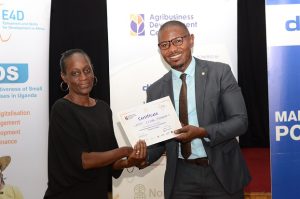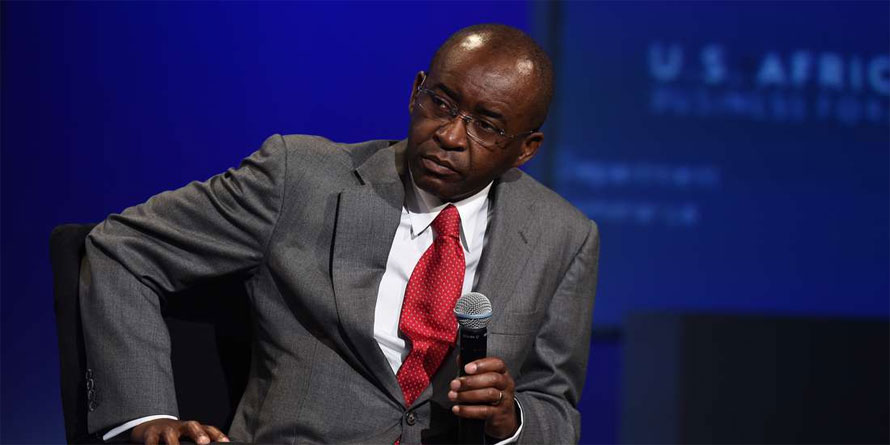Ronald Kasasa (R), Head of Business Banking at dfcu Bank, handing over a certificate to one of the participants at the launch of the Environmental, Social, and Governance (ESG) module yesterday at Silver Spring, Bugolobi organized by dfcu Bank.
dfcu Bank, in partnership with GOPA Worldwide Consultants, have today successfully launched an Environmental, Social, and Governance (ESG) module during a training session held at Silver Springs Hotel in Bugolobi. The event aimed to equip Small and Medium Enterprises (SMEs) with essential knowledge on the factors that influence the sustainability and future performance of their organizations.
Henceforth, the ESG module has been incorporated into the Business Accelerator Program (BAP) curriculum, which is implemented by the Agribusiness Development Centre (ADC) and fully sponsored by dfcu Bank.
The training targeted over 150 SMEs across various sectors, including Agribusinesses, Manufacturing, Processors, and Hospitality among others, is part of dfcu Bank’s ongoing commitment to support the growth and development of SMEs in Uganda. Key takeaways from the training emphasize the importance of climate change mitigation and the opportunities it presents for SMEs that embrace sustainability early in their lifecycle. By embedding sustainable practices from the outset, businesses can foster growth and evolution while gaining a competitive edge and ensuring the resiliency of their operations.
The ESG module was developed by GOPA Worldwide Consultants as part of the E4D – Enhancing Competitiveness of Small and Medium-Size Enterprises (ECOS) Project, funded by GIZ, aimed at supporting Ugandan SMEs. Earlier this year, dfcu Bank, in collaboration with ADC and GOPA Worldwide Consultants, committed to upskilling 200 SMEs through the ongoing Business Accelerator Program.
Josephine Mukumbya, the Executive Director of Agribusiness Development Centre provided the attendees of the seminar with an insightful introduction to the concept of Environmental, Social, and Governance (ESG), highlighting the need for SMEs to adopt sustainable practices that minimize environmental impact, create inclusive work environments, and prioritize employee well-being. Mukumbya’s compelling message encouraged attendees to embrace the concept of ESG and integrate it into their business strategies, ultimately making a positive impact on society and driving long-term success.
Ronald Kasasa, Head of Business Banking at dfcu Bank, shared that dfcu Bank is thrilled to be actively involved in this partnership as it continues to demonstrate its unwavering commitment to empowering small and medium enterprises (SMEs) in Uganda. “By collaborating with esteemed organizations like GOPA Worldwide Consultants and ADC, we can bring valuable resources and expertise to our valued customers. This training session underlines our dedication to equipping SMEs with the knowledge and tools they need to navigate the challenges of today’s business landscape. We firmly believe that sustainable practices and responsible governance are the keys to long-term success,” he said.
“At dfcu Bank, we are not only providing financial support to these SMEs but also establishing a dedicated unit that offers guidance and advisory services to ensure SMEs align with ESG standards and enhance their governance practices. Together, we will create a thriving ecosystem where SMEs flourish and contribute to a greener and more socially responsible Uganda,” Kasasa added.

Jimmy Byaruhanga, the representative from GOPA, and Martin Birungi, responsible for projects at Besepo (U) Limited, delivered compelling speeches at the training session. Byaruhanga highlighted the transformative impact of the Enhancing the Competitiveness of Small and Medium Size Enterprises (ECOS) program on SMEs, showcasing cost-effective methods for managing businesses and obtaining certifications for international trade.
Birungi shared invaluable insights from Besepo (U) Limited’s journey towards sustainable practices, including afforestation and waste conversion into briquettes. Their speeches underscored the tangible benefits of embracing environmental sustainability and demonstrated how SMEs can thrive by incorporating ESG principles into their operations.
The event concluded with an engaging test that allowed participants to apply their newfound knowledge. To recognize their dedication and successful completion of the training, certificates were awarded to all participants.





